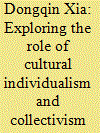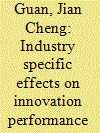| Srl | Item |
| 1 |
ID:
166962


|
|
|
|
|
| Summary/Abstract |
Public acceptance (PA) is nowadays essential for the sustainable development of nuclear energy and becomes an important issue for research community. Although some studies had investigated the factors influencing PA of nuclear energy, few researches were founded to verify the impact of cultural values. This research proposed a theoretical model to explore how individualism and collectivism, as an important dimension of culture, moderated the relevance between perceived risk/benefit and PA. A questionnaire survey was conducted nationwide in China whose number of under-construction nuclear power plants ranks first in the world, and received 887 valid responses. The analysis of moderating effect showed individualism weakened the relevance between perceived benefit and PA, whereas collectivism had no significant moderating role on the relevance between perceived benefit and PA. Collectivism strengthened the relevance between perceived risk and PA, whereas individualism had no significant moderating role on the relevance between perceived risk and PA. Moreover, perceived benefit was confirmed to be a more important predictor for PA than perceived risk. The above-mentioned findings could not only provide new insights that help to understand the difference in energy policies between China and the developed countries, but also provide new reference and guidance for the future policymaking.
|
|
|
|
|
|
|
|
|
|
|
|
|
|
|
|
| 2 |
ID:
159051


|
|
|
|
|
| Summary/Abstract |
This research aims to understand how industrial characteristics in Chinese industrial sectors are related to and affect innovation activities. Using Heckman's two-step procedure, this study contributes to examine firms' innovation determinants with a framework that clearly distinguishes between the two steps of innovation model: innovation propensity (probability of being innovative) and innovation performance (patents and innovation sales). In particular, the moderating effects of industrial characteristics on the relationships between R&D intensity, financial incentives and innovation performance are discussed. The findings show that different industrial characteristics generate different impacts on innovation propensity and innovation performance. Firms in capital intensive industries and relative monopoly industries are more likely to innovate. The findings also show that Direct Government Subsidy does not contribute significantly to improve economical innovation performance of firms and Indirect Government Subsidy on innovative economic performance is easier to be influenced by industry characteristics, which have important potential policy implications to guide innovation activities for Chinese policy makers as well as for Chinese firms.
|
|
|
|
|
|
|
|
|
|
|
|
|
|
|
|
| 3 |
ID:
177353


|
|
|
|
|
| Summary/Abstract |
Against the background of the increasing number of large and medium-sized cities and the improvement of the intercity transportation infrastructure, a polycentric urban network is gradually emerging in China. Based on panel data of 23 provinces of China over the period of 1998–2018, the dynamic impact of the polycentric spatial structure on the energy efficiency and the mechanism of this impact are explored in this paper. First, the results reveal that there exists an inverted U-shaped relationship between the polycentric spatial structure and the energy efficiency. Nevertheless, the polycentric spatial structure has not yet reached the optimal level in all provinces. Second, the market integration and factor flow are important paths for the polycentric spatial structure to affect the energy efficiency. Third, the inverted U-shaped impact of the polycentric spatial structure on the energy efficiency is mainly reflected in the eastern and central regions, while the phenomenon is not significant in the western region. Finally, the distances between cities and the level of the transportation infrastructure have significant non-linear moderating effects in the process of the polycentric spatial structure affecting the energy efficiency. These findings provide empirical evidence for the coordinated development of China's regional space planning and energy efficiency.
|
|
|
|
|
|
|
|
|
|
|
|
|
|
|
|
| 4 |
ID:
186000


|
|
|
|
|
| Summary/Abstract |
The COVID-19 global pandemic has had a devastating impact on economies and could lead to a surge in shadow or informal economic activity. Perhaps more than ever it is imperative to understand the nature and drivers of shadow economies. The primary focus of this analysis is to reexamine the relationship between corruption and shadow economies by extending previous research to consider a possible moderating effect between economic development and corruption on shadow economies. It is hypothesised that the effect of corruption on the shadow economy will vary with the level of economic development, with corruption having the strongest positive effect in low income countries, but this effect will be mitigated as the level of economic development increases. We find empirical evidence to support this hypothesis using multiple data measures of country corruption and the size of the shadow economy. Policy implications are offered based on the empirical results.
|
|
|
|
|
|
|
|
|
|
|
|
|
|
|
|